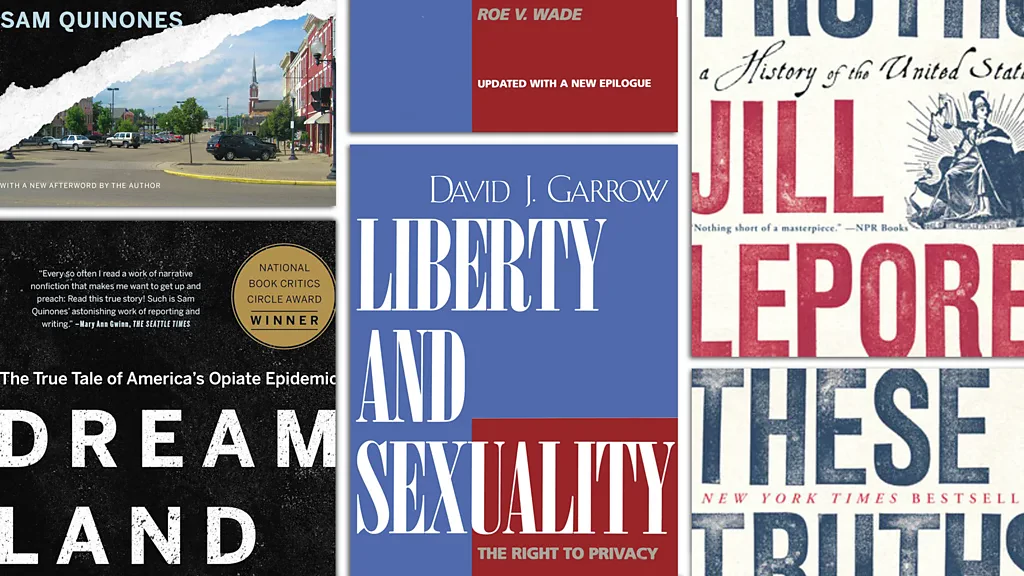Six books to help understand the US and its politics

(Credit: Bloomsbury Press, University of California Press, W W Norton & Company)
From the pursuit of happiness to the economy – in the run-up to the election, here are some books that offer context, insight and perspectives on the US.
In the run-up to the 2024 US presidential election, it seems there is plenty for the population to disagree on. To help understand the differences of opinion, consider the following six books, which offer detailed analyses of the issues and their context. The books cover everything from the Declaration of Independence and shifts in conservative politics – beginning in the Reagan era – to the US's cultural foundations. Also in the mix: the opioid drug epidemic, initiated in 1996 by the marketing of the prescription pain medication Oxycontin, and the economy, amid concerns about the cost of living. Will the US be able to achieve a sense of "We the people" despite disagreements? That's the question to be answered by the 5 November election.
These Truths – A History of the United States by Jill Lepore (2018)
Harvard history professor and New Yorker contributor Jill Lepore draws the title of her comprehensive and gripping US history from the Declaration of Independence: "We hold these truths to be self-evident, that all men are created equal, that they are endowed by their Creator with certain unalienable Rights, that among these are Life, Liberty and the pursuit of Happiness." Covering the 16th Century through to 2018, the book is "the story of a nation, multiracial at its founding, and those who sought to find ways to realise 'these truths,'" writes John S Gardner in The Guardian. "No country before or since has been this convulsed with conflict and wealth," writes Andrew Sullivan in The New York Times Book Review. "No country had ever been defined as one of strangers and travellers, where waves and waves of immigration constantly churned through society… No people were as passionate both for slavery and for freedom." These Truths is the perfect civics book for these times. It is not a story of "relentless progress", notes The New York Times Best Books of 2018, "but of conflict and contradiction, with crosscurrents of reason and faith, black and white, immigrant and native, industry and agriculture rippling through a narrative that is far from completion."
Reaganland: America's Right Turn 1976-1980 by Rick Perlstein (2020)
The last of Pearlstein's four-volume chronicle of the rise of conservatism in the US is a colourful narrative history. Perlstein begins with the Gerald Ford/Jimmy Carter presidential campaign. Reagan, a primary candidate who didn't make the cut, refused to help Ford, setting the stage for his own successful run against Carter four years later. "It's all here – the proposed Equal Rights Amendment, brother Billy, the Panama Canal Treaty, California's Proposition 13 cutting property taxes, supply side economics, the 'killer rabbit', direct mail, the Ford Pinto, Ted Kennedy, Three Mile Island, malaise and a hundred other incidents and stories that defined these tumultuous years," John S Gardner writes in The Guardian. Reaganland "is essentially sociopolitical history, focusing on the movements and causes that animated public debate so virulently and the impacts of major social changes, such as women's rights, on American life". Follow it with Max Boot's new biography, Reagan, which focuses on the links between Reagan and GOP presidential candidate Donald Trump.
Democracy and Solidarity: On the Cultural Roots of America's Political Crisis by James Davison Hunter (2024)
In Culture Wars (1991), Hunter coined the term that describes the divide between two opposing forces in the US. "Democracy in America is in crisis," he writes in Democracy and Solidarity, his new book. He examines US political culture over two-and-a-half centuries, identifies the cultural roots of the crisis – the promise that all are created equal, versus the practice of excluding wide swaths of humanity. "Hunter is the nation's leading cultural historian," writes David Brooks in The New York Times. "He reminds us that a nation's political life rests upon cultural foundations. Each society has its own way of seeing the world, its own basic assumptions about what is right and wrong, its own vision of a better world that gives national life direction and purpose." American culture, which often achieves solidarity through opposition to a common enemy or affirmation of a common goal, has "unravelled at its deepest levels," Hunter writes.
Liberty and Sexuality by David J Garrow (1998)
In June 2022, in Dobbs v Jackson Women's Health Organisation, the US Supreme Court overturned the 1973 Roe v Wade decision that granted women the constitutional right to abortion, based on the right to privacy implied in the 14th Amendment. This action set in motion an avalanche of state bills to ban abortion, and parallel protests and actions to restore Roe. In Garrow's landmark legal history, he begins with a 40-year struggle to repeal Connecticut's law banning birth control. He fastidiously covers Roe v Wade, its precursors and successors, including the 25 years of litigation post-Roe. It is a "a monumental, sprawling, insightful, frustrating, challenging and wide-ranging book that chronicles one of the most profound transformations in the lives of modern Americans," writes sociologist and legal scholar Kristin Luker in The New York Times. She notes that "much of the struggle over the boundaries of the sexual revolution took place in legislatures and in courtrooms". The case, concludes Garrow, represents one of the two most important stories in 20th-Century legal history (the other is Brown vs Board of Education). What comes next is likely to be determined by the US presidential election.
Dreamland by Sam Quinones (2015)
Quinones's National Book Critics Circle award-winning Dreamland pieces together the puzzle of "the worst drug scourge to ever hit the country". "Children of the most privileged group in the wealthiest country in the history of the world were getting hooked and dying in almost epidemic numbers through substances meant to numb pain," he writes. Overdose deaths involving opiates rose from 10 a day in 1999 to one every 30 minutes by 2012. Quinones's chronicle of "pain pills, pill mills, Mexican traffickers, the quiet surrounding the epidemic," is told in dramatic, heartbreaking detail, connecting small towns and suburbs across the US with a small town in Mexico in a "catastrophic synergy". OxyContin came first, he writes, "introduced by reps from Purdue Pharma over steak and dessert and in air-conditioned doctors' offices. Within a few years, black tar heroin followed in tiny, uninflated balloons held in the mouths of sugarcane farm boys from Xalisco driving old Nissan Sentras to meet-ups in McDonald's parking lots". Quinones offers glimmers of hope, including the widespread availability of naloxone, the heroin overdose antidote (also used now against fentanyl, the synthetic opioid 50 times more powerful than heroin). The ultimate antidote, he argues, is community.
Life After Capitalism by George Gilder (2023)
Economist Gilder's 1981 book Wealth and Poverty defined supply-side economics, and influenced the politics of the Reagan administration. His new one offers a contrarian theory based on the concept that knowledge is the true wealth. "When you insert your credit card into the gas pump, what you're really buying is the knowledge that makes the transaction possible," Gilder writes. The essence of life after capitalism, he argues, is "the enormous shift of power – enabled by government control of money… away from productive citizens, innovators, and entrepreneurs to politicians, bankers and bureaucrats". Gilder's system is based on information theory. "Economics focuses on human wants and incentives; information theory focuses on human creativity." His key principles: "Wealth is knowledge, growth is learning, information is surprise, money is time." Gilder tends to side with optimists, confident that technology, entrepreneurship and innovation can drive economic progress. Economic concerns are key to the upcoming election, with the majority of Americans (some 70%, according to Pew research), worrying about the rising costs of food and housing.




Leave Comment